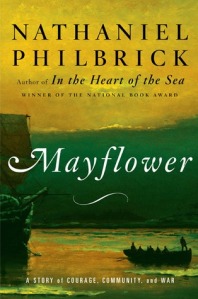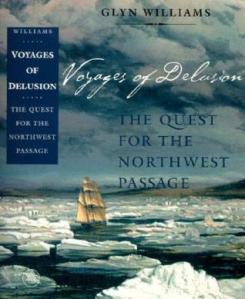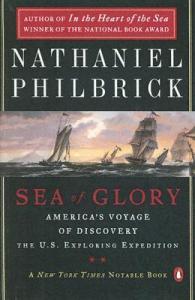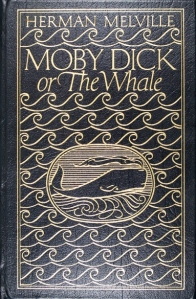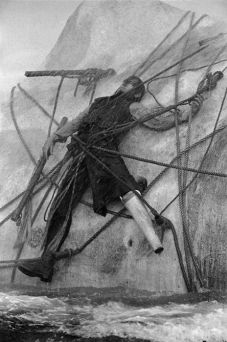If you’re anything like me, you read enough books to know the type of stories you enjoy the most. I’m all over the map — non-fiction, fiction, historical fiction, self-help, business — doesn’t matter. I’ve read them all, and I’ll probably read them again. Somehow, I always come back to books centered on those adventurers sailing the seven seas.
The spirit of the sea-going explorer in the pre-industrial age was one of incalculable risk. The unforeseen perils that awaited those brave and often foolish souls are still, to this day, some of the greatest adventure stories ever told in literature (The Odyssey, anyone?). Of all the books I’ve read, the seafaring genre has engaged me like few others. Featured below are five such books, fiction and non-fiction, that have stuck with me through the years. If you have read any of them feel free to leave a comment with your take.
Ahab’s Wife, or The Stargazer | Sena Jeter Naslund
After picking up this book and reading the sleeve I thought, if well-written, this could be a fascinating angle on the Moby Dick legend. Ahab’s Wife centers on the life of Una, a life that includes marrying the loving, caring man who eventually morphs into the deranged Captain Ahab, a figure some consider to be one of the most vengeful spirits in American literature. Though Ahab exists in only a portion of Una’s life, no aspect of her remaining journey escapes his touch. In ways good and bad, Ahab’s essence stays with Una the rest of her life, just as the maddening spectre of Moby Dick haunted Ahab the rest of his.
The book takes a while to hit stride. I found myself wanting to fast-forward more than a few times to the point when Ahab makes his grand debut. It was then I had to remind myself this is Una’s life, not Ahab’s. Her escape from her Bible-thumping, hell-fire raising, and abusive Kentucky father to the nurturing shores of New England was merely the beginning. Stowing away on a whaling ship was the true adventure she had been seeking and, for the rest of her life, that’s exactly what she got. If you’re looking for a story to invest long-term, through the monotony of Una’s everyday life to the hair-raising moments at sea, this is a good story for you. It’s a tale of a head-strong woman ahead of her time, taking ownership of the life she chose, for better and for worse.
Mayflower: A Story Of Community, Courage, and War | Nathaniel Philbrick
Now here’s a wake-up call. Remember in kindergarten when Mrs. Lee got the whole class together and told the story of the pious English Pilgrims coming over and putting their stake in this new land? She spoke of gracious harmony and inter-cultural peace and love between the Wampanoag Indians and the weary travelers from the Old World. The Pilgrims were just trying to survive the first winter, and wouldn’t have without the kind assistance from the local “savages.”
It’s bogus. Baloney. Bullshit.
The occupation of the “pale-faces” from lands unknown was an introduction to 56 years of blood, courage, war, compromise, love, paranoia, friendships, tears, alliances made, sacrifice, alliances broken, loss, suffering, disease, and hard living as the British exiles struggled to establish themselves in an uncultured, unrefined, and unforgiving land. There were always uneasy alliances with various tribes in the region, but with misunderstandings, double-crosses, and paranoid leaders throughout, nothing was certain in those first five decades. Author Nathaniel Philbrick is painfully exact and blunt when it comes to describing the Pilgrims’ lives, just as he is equally adept at describing the mystery and uncertainty felt by the people whose land was being invaded by beings they had never seen and knew nothing about.
When it comes to Philbrick, it’s always about the detail. Much like my other favorite authors, James Michener and David McCullough, Philbrick’s research is exhaustive, delving into the details and history that really make the difference in the historical accounts he wrote about. If you want to learn the real, factual accounting of the first years of European colonization in North America, Mayflower is what you’ve been looking for.
Voyages Of Delusion: The Quest For the Northwest Passage | Glyn Williams
It’s one thing to understand the business of maritime expeditions, discovery, and profit in the 18th century. It was an era when explorers had mere nautical drawings of coastal shorelines that only led the way to land borders they hadn’t yet discovered. What blew my mind about Glyn Williams‘s Voyages Of Delusion was even after SO MANY failed attempts to find the mythical Northwest Passage, so many millions spent, so many men never coming back, those sick and twisted US and British financiers kept sending them. Even as the explorers and vessels never returned, those financiers still made millions off their deaths, whether they came back or not.
Reading that back, it doesn’t necessarily sound like something one would want to read. Why would you invest in a book about such ideas? My answer is it’s part of how this nation came to find itself, how it came to form. Exploration of the time, in all its ambition, gluttony, and danger, is one of the reasons this country even exists. It’s part of who we are, for better or worse. Last of all, Voyages Of Delusion is just pure fun. It’s suspenseful and exciting, just like one might imagine the high seas!
Sea Of Glory: America’s Voyage Of Discovery, the U.S. Exploring Expedition, 1838-1842 |Nathaniel Philbrick
Next to Moby Dick, Sea Of Glory is probably my favorite of the bunch. The historic 4-year voyage of the U.S. Exploring Expedition is the foundation for everything we’ve come to know about the continent of Antarctica, the majority of the Pacific Ocean, even the mapping of Puget Sound in what is now Washington state. What these men did, what they survived, and what they accomplished, is nothing short of extraordinary. Had it not been real, it would be chalked up to myth. There were still rumors flying around at the time if you sailed far enough south you’d either fall off the edge of the earth or encounter deadly sea monsters. Probably both. Their accomplishments and discoveries included new plant and animal species never seen before, and islands with inhabitants who’d never seen a white man. So significant and transformative were their findings, officials had more than enough specimens to lay the foundation for what is now the Smithsonian Institution in Washington, D.C.
The other dynamic of the story lies with the personalities on the six-ship fleet, particularly the expedition’s commander, Charles Wilkes. Even though Wilkes was a talent in nautical surveying, he was exceedingly unseasoned, arrogant, domineering, and temperamental. He was quick to punish, often so harshly mutinies were never far away in the minds of the crew. Fortunately or unfortunately, Wilkes’s nautical survey work and connections with the Naval Observatory prompted his assignation as commander of the expedition over several more qualified officers, some of whom actually served under him on the voyage.
This is vintage Philbrick. The dude just knows how to tell a story. Again, just as he did with Mayflower, the research conducted for the writing of Sea Of Glory must have been exhausting. Told in amazing detail, it’s a saga of cutting-edge exploration, courage, ambition, loyalty, death, and the consequences of ego. When people ask me the best book I’ve ever read, if I don’t say Sea of Glory, then it’s definitely in the top two.
Moby Dick; or, ‘The Whale’ | Herman Melville
It would be hard to not include Moby Dick in the discussion of “greatest American novel”. Written by Herman Melville and published in relative obscurity and mixed reviews on October 18, 1851, the book wouldn’t gain fame until the 1930s, decades after Melville’s death. Said to be attributed to the sinking of the whale ship Essex in 1820 by a rambunctious sperm whale in the southeast Pacific, another account may have contributed to Melville’s novel with the capture and killing of the notorious albino sperm whale “Mocha Dick” in the late 1830s off the Chilean island of Mocha. This fearsome whale seemed to attack with premeditated aggression, even after 3 decades collecting as many as 20 harpoons in its back from glory-seeking whalers hungry to be the one to catch the famous beast.
Not even the most brief descriptions for Moby Dick can go without mentioning one of the greatest antagonists in Western literature, Captain Ahab. This guy is about as much a “piece of work” as you’re going to find. This fella can hold a grudge. Granted, I’d be hating life, and chance, and karma if a freakin’ whale bit off MY leg, but damn. This dude went certifiably insane; his sole goal, his direction in life from then on was finding the White Whale, Moby Dick, and planting a harpoon right through its heart. There’s grudges, and then there’s serious, tunnel-vision missions in life. Ahab didn’t care about anything else, and he paid for it with his death, strapped to the very target he hated with his entire soul.
When I saw the chance to order the book from Easton Press‘s “100 Greatest Books Ever Written“, complete with the sexy leather binding and gold-edged trim, I chose to go with the genre I enjoyed most. Seafaring novels don’t get any better or more iconic than Moby Dick. I will concede the style of Modern English Melville employs isn’t as easy to read as the Modern English used today. I found myself consistently turning back to read a paragraph or an entire page over again to make sure I understood. I’m really picky with following a story and I don’t skim. I’m glad I don’t because there’s not a page in this book that doesn’t contain a lesson or a proverb you can’t take away. The novel is a veritable quote factory.
Moby Dick is a tale to which every one of us can relate. It’s a story of obsession, love, loss, faith, sacrifice, hope, loyalty, malevolent hatred, rivalry, envy, pure friendship, death, and any other parallel you can imagine. It’s everything some one-dimensional wacko chasing a catch is not. It’s a parable of life itself; you WILL see something, probably a lot of things, within its pages. It takes effort and patience, but in the end, you’ll see yourself in there somewhere.

